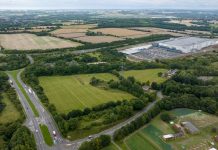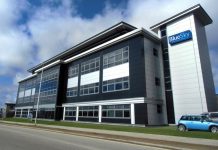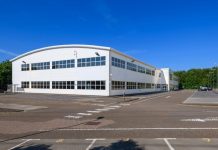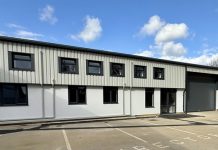In their most recent report, Bidwells found that Cambridge and Oxford are attracting digital tech and science firms to look outside of the capital. Having reported on high investments in growth, Cambridge, Oxford and London are creating a world leading hub of innovation and development, also referred to as the ‘Golden Triangle’.
Six of the top ten most productive cities in the UK in 2017 are projected to fall within the Golden Triangle and Eastern region. In order, productivity will be strongest in Cambridge, Oxford, Milton Keynes, Ipswich, Norwich and London.
The Cambridge-London-Oxford Golden Triangle continues to experience strong growth and is well placed to weather the uncertainties of Brexit.
What is the Golden Triangle?
First coined to describe the relationship between the universities in Cambridge, London and Oxford, the ‘Golden Triangle’ has now become a hot bed for companies in the ‘knowledge’ economy – technology and the sciences.
Companies setting up in the ‘Golden Triangle’ often choose the area due to the high volume of talented graduates leaving the universities, the transport links and quality of life found in each of the cities.
Cambridge has the highest concentration of digital tech expertise in the UK outside of London
Ranked 12th in the European Digital City Index and housing the greatest level of digital tech skills outside of London by Tech Nation 2017, Cambridge has been dubbed “Silicon Fen” after generating revenues of £2.1bn for the UK economy, attracting £153m of digital tech investment and over 30,000 digital tech jobs to the UK.
Aided by motivated and talented graduates from Cambridge University taking up tech and science roles in the city, Cambridge has been named in Glassdoor’s top 3 of the ‘Best UK Cities for Jobs’ list 2 years running, thanks to its high quality of life, high median salary and transport links.
As a result, Cambridge Council have joined forces with investors to redevelop council owned land in order to meet the growing need for housing in the area. However, it’s not just housing in Cambridge that has seen an increase in demand.
The prices for office and laboratory space have also increased in the first 6 months of 2017, rising 2.7% to £38 per sq. ft., due to shortages in space and an increase in demand, leading to landlords raising their prices.
Oxford the fifth largest and one of the most dynamic digital tech economies in the UK
In 2016, Oxford, home to Times Higher Education’s top ranked university in the world, saw the university’s research commercialisation company, Oxford University Innovation (OUI), and its investment partner Oxford Science Innovation (OSI) attract a combined £632.5m of funding for 59 companies. Much of the funding (£580m) raised by OSI came from several Asian investors.
In total, 232 Oxford tech start-ups were born in 2016 and the number of tech jobs reached over 26,000 according to Tech Nation. To be expected, with the number of companies and jobs rising, the city’s GVA (Gross Value Added) hit £1.1bn and, of the 232 companies in Oxford, 18% were rated High Growth Firms by Tech Nation 2017.
The values of the rents in the city and the talent coming out of the university are driving the growth in the city. In the latest research from Bidwells, the firm recorded a 74% increase in office and laboratory demand and a new high of £30psf for prime office and laboratory space. However, despite the rise, this is still £40psf cheaper than office or laboratory space in London.
The rise in demand and prices helped lead to the ‘Canada Pension Plan Investment Board’ funding a 50% stake, for £200m, in Milton Park, Abingdon, a newly built office and laboratory business park, intended to aid in the development and growth of local companies.
Being home to the Times World University Rankings 2018 ‘Best University’, it is no surprise that Oxford based companies look to take advantage of the talent on their doorstep. Dr Graeme Smith, CEO at Oxbotica said “It’s fantastic to have a global, world-leading talent pool right on our doorstep”, a view also expressed by Lauren Fletcher, CEO & Founder at Biocarbon Engineering, who said “Our Oxford location has given us access to a diverse talent pool, research labs, greenhouses and outdoor trial sites. It also offers easy access to London and the rest of the world”.
London named the Digital Capital of Europe
Since the Brexit vote, London saw its growth, in the last 12 months, fall in line with the rest of the UK – at 2.7%.
However, despite the overall slowing in the London economy, the ‘knowledge’ economy has remained strong and seen the UK’s capital named the ‘Digital Capital of Europe’ by Tech Nation, having amassed an astonishing £2.2bn of investment in 2016 – over £1bn more than its closest rivals Paris and Amsterdam.
In line with the slowing of the general London economy, London has seen demand for office and laboratory space fall by 16% in the ‘West End’ and spread to London’s other markets. Because of demand falling, prices have also fallen or stagnated across the capital, with the ‘West End’ seeing the biggest fall of 12.3% in the past 12 months.
Being Europe’s ‘Digital Capital’, and housing four of the UKs best universities, it is unsurprising that of the 300,000 ‘knowledge’ economy workers in London, it is estimated that 31% are originally from overseas. However, this could be in jeopardy, with an estimated 13% of London’s work force coming from the EU and registrations for non-UK nationals coming to the capital for work falling by 15% in the first quarter of 2017, the capital could soon see its talent pool and reputation reduced.
Conclusion
Business and the Knowledge Economy is booming in the Golden Triangle. Oxford and Cambridge’s rise in the World University Rankings, their cheaper prices and better quality of life on offer are attracting firms to look outside of the capital.
The Golden Triangle is likely to play a key role in post-Brexit economy. By moving away from the capital, firms can attract world leading talent, find modern office / lab space while remaining close to London and the ‘Digital Capital of Europe’.






















